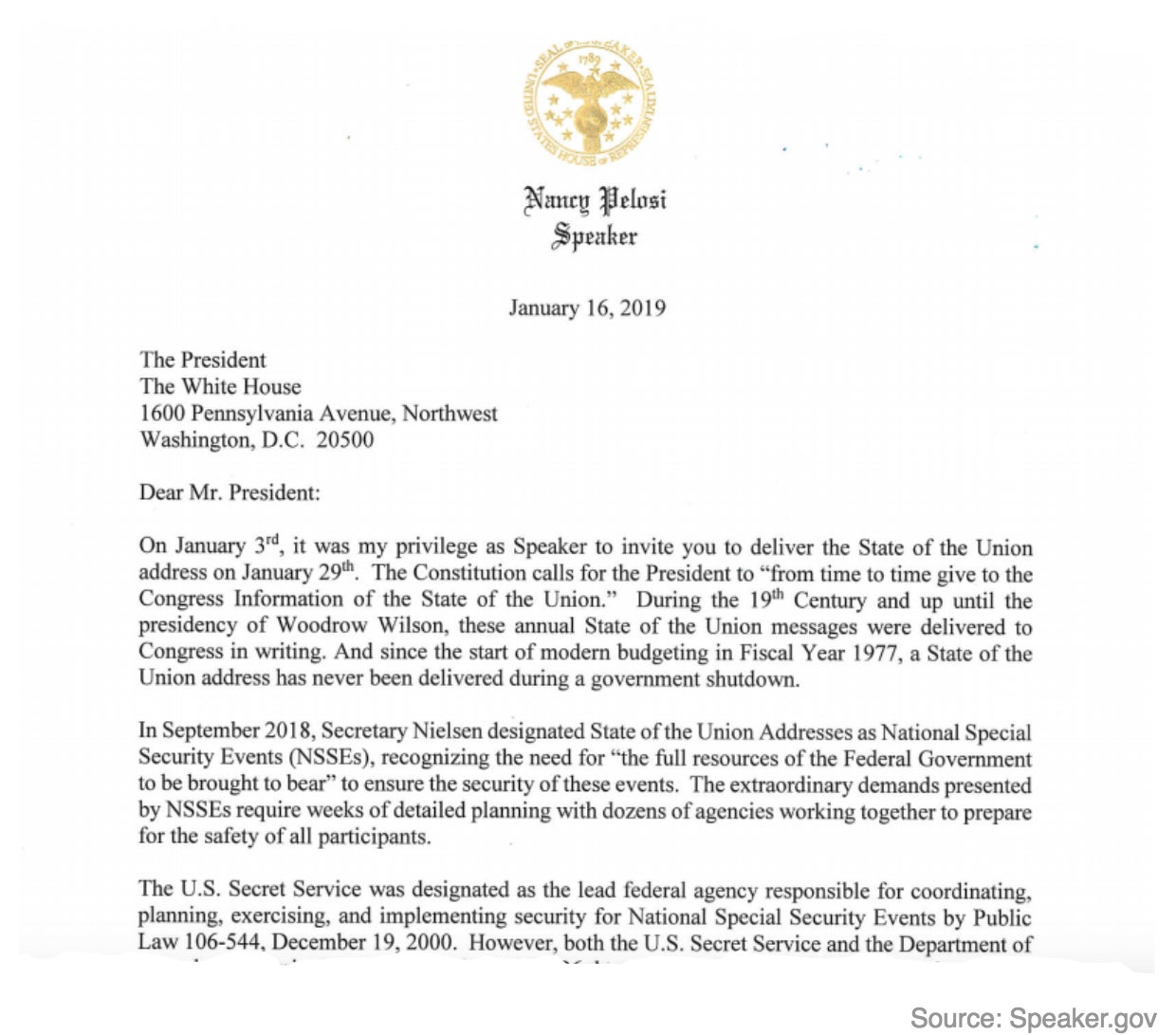Here’s why Pelosi’s request to postpone Trump’s SOTU makes perfect sense
US House Speaker Nancy Pelosi is disinviting Donald Trump from his scheduled State of the Union address to Congress planned for the end of this month.


US House Speaker Nancy Pelosi is disinviting Donald Trump from his scheduled State of the Union address to Congress planned for the end of this month.
In a letter sent to the White House on Wednesday (Jan. 16), she said the government shutdown, now on its 26th day, is complicating security logistics for the event, which is usually attended by every member of Congress and the vice president. The lead agency in charge of SOTU security, the US Secret Service, is operating without funding.

“Sadly, given the security concerns and unless government re-opens this week, I suggest that we work together to determine another suitable date after government has re-opened for this address or for you to consider delivering your State of the Union address in writing to the Congress on January 29th,” she wrote, pointing out that no president has ever delivered his remarks to Congress in person during a government shutdown. (Last year, Trump delivered his SOTU the week after a two-day shutdown.)
The White House did not immediately respond to a request for comment.
The SOTU, as the yearly address is dubbed, is a prime opportunity for presidents to tout their accomplishments and snub political opponents before a large swath of the American public. Last year, 46 million people tuned in to watch Trump’s first SOTU.
As far as viewership is concerned, the SOTU isn’t exactly the Super Bowl, which drew 103.4 million viewers in 2018. But it is on par with the football championship in its mandated security requirements. Going ahead with it despite the shutdown would strain resources and sink already-sagging morale among Secret Service staff even lower, former federal agents who’ve worked similar events told Quartz.
A State of the Union address is considered a National Security Special Event, or an “NSSE,” a category established in 1998 by president Bill Clinton. Aside from the Super Bowl, other events designated as NSSEs have included presidential inaugurations, the Olympic Games held in the US, and in 2004, “all activities relating to the memorial services” for former president Ronald Reagan. The state funeral held for former president George HW Bush last month was also designated a NSSE.
Orchestrating an NSSE can begin up to 18 months in advance and involves multiple federal and local law enforcement agencies. The US Secret Service, whose employees are not receiving their paychecks until after the shutdown ends, takes the lead on coordinating, planning, and security. The FBI is responsible for intelligence, law enforcement, and crisis management; FEMA is tasked with “consequence management.”
“I can’t discuss the methods and means, but it is a behemoth task,” says James Tomsheck, a now-retired 23-year Secret Service veteran. “The level of planning an SOTU, like all NSSEs, is significant. The amount of interagency coordination and communication is very significant.”
Just how significant? For president Barack Obama’s 2010 State of the Union address, the Secret Service coordinated with 12 federal, regional, and DC-specific agencies, including the US Attorney’s Office for the District of Columbia; the FAA; and the Bureau of Alcohol, Tobacco, Firearms and Explosives.
There are barricades and security fencing to erect, special access accreditation badges to generate, and K-9 teams to prepare, according to a report issued by the Congressional Research Service. Nuclear Incident Response Teams have to be at the ready. Because the SOTU is attended by the country’s top leadership, it also involves taking a so-called “designated survivor” to a secure location during the address (Sonny Perdue, the Secretary of Agriculture, was last year’s designee).
Dennis Franks, a former FBI supervisory special agent and SWAT team leader who has worked multiple NSSEs, says he’s not sure how all the necessary tasks could be pulled off in the midst of a government shutdown without cutting corners. He called the idea of going ahead with SOTU as scheduled “ludicrous…based on all the requirements that are necessary to ensure that one of these NSSEs is successfully planned for and executed.”
The Secret Service referred Quartz to the Department of Homeland Security, which didn’t immediately respond to Quartz’s request for comment. A separate request sent to DHS earlier this month was met with an automated response explaining that the agency’s press officers had all been furloughed.
On Wednesday, Homeland Security secretary Kirstjen Nielsen tweeted her agency is ready for the SOTU.
If the SOTU does happen while the government is still shut down, Tomsheck is confident in the Secret Service’s ability to fully secure it. “However, they’ve already missed one paycheck and are moving towards another,” he said. “Yes, the Secret Service will get the job done, but there is not an agency where working for a protracted period of time, without pay, without an end in sight, doesn’t have an impact on morale.”